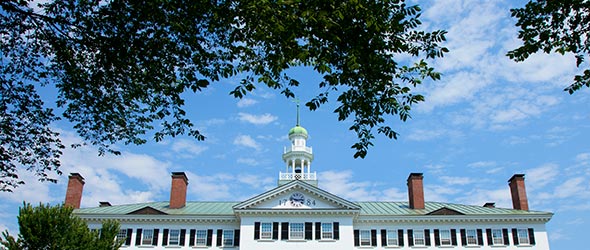
- About
- Departments & Services
- Projects
- Construction in Progress
- Service Requests
- News & Communications
Back to Top Nav
Back to Top Nav
Back to Top Nav

Photo by Joseph Mehling ’69
The Dartmouth Board of Trustees received wide-ranging reports on Dartmouth’s mission and future plans for all areas of the institution, including the Tuck School of Business, Thayer School of Engineering, and the Geisel School of Medicine. The broad discussions provided Board members with opportunities to reflect on the ambitions of Dartmouth's academic enterprise and consider the next steps in the implementation of President Phil Hanlon's vision of excellence and impact.
Provost Carolyn Dever made her first presentation to the Board and led a discussion about her academic vision for Dartmouth. Dever framed academics as the driver of institutional decision-making, and outlined a broad series of initiatives in support of undergraduate, graduate, and professional students as well as faculty.
“I invite all members of the Dartmouth community to measure every investment in terms of its impact on our mission of academic excellence," she said.
In addition to discussions touching on advancement, student affairs, and the performance of the endowment, as well as financial and resource planning, the Board received a progress report from the Moving Dartmouth Forward Presidential Steering Committee and an informational presentation on residential concepts from Interim Dean of the College Inge-Lise Ameer and Vice President for Campus Planning Lisa Hogarty.
The meeting began with the inauguration of the Dartmouth Entrepreneurial Network (DEN) Innovation Center and New Venture Incubator, where the Board met and discussed how the new center will support President Hanlon's goal of increasing Dartmouth's global impact while expanding the College’s commitment to innovation and experiential learning.
“Dartmouth is a place that thinks boldly,” said Hanlon ’77. “We want our students to be audacious and take risks. It is my hope that the new center will be a destination on campus, a hotbed of ideas, and a place that is alive and electric and crowded with students.”
The center officially opens on October 1, and is student-designed and managed. Guidance and oversight will be provided by Office of Entrepreneurship and Technology Transfer, led by experienced technology entrepreneurs Tillman Gerngross, associate provost for entrepreneurship and technology transfer and professor of bioengineering, and Trip Davis ’90.
“Our students, faculty, and alumni are people who have a passion for starting things, founding things, and creating things,” said Board Chair Bill Helman ’80. “The center is going to facilitate a constant stream of entrepreneurial activities, from start-up companies to academic endeavors. It’s going to give innovation at Dartmouth a home.”
The Board also approved the second-phase schematic design of the Hood Museum of Art project with funding from a reserve gift. The project is vital to the museum's teaching mission—to create an ideal learning environment that fosters transformative encounters with works of art.
In addition to providing a new gateway to Dartmouth's Arts and Innovation District from Wheelock Street, the project will encompass a Museum Learning Center that triples the museum’s teaching capacity with three new, state-of-the-art object-study rooms that will be equipped with smart technology and able to accommodate a range of class sizes.
The expansion of the Hood will support its increasing vitality as an educational resource for Dartmouth students and faculty across a range of disciplines, and for visitors from around the world.
"With new gallery spaces, technologically advanced learning facilities, and enhanced access for students and faculty, the Hood is recommitting itself to the kind of experiential learning-by-doing that sets it apart," said Michael Taylor, director of the museum.
Barbara Will, chair of the Moving Dartmouth Forward (MDF) Presidential Steering Committee, provided Board members with an update on the committee's work. Over the last two months, the committee has continued to engage with the Dartmouth community. An intensive outreach effort to alumni in July produced important feedback; at the same time, student engagement—particularly by the class of 2016—has been steadily growing.
Many student groups have expressed a desire to continue to meet with the committee throughout the fall. The committee has also consulted with experts and conducted extensive research into best practices at other institutions.
The Board's annual September meeting was the first time Board members joined Hanlon and alumni volunteers for the Class Officers Weekend Dinner and Awards Gala, which took place on Friday evening.